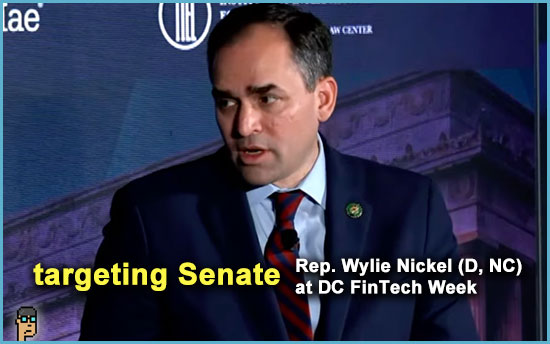Nickel to step aside
Rep. Wiley Nickel (D, NC) will not run for re-election in the 119th Congress. Like his state colleague, House Financial Services Chair Patrick McHenry (R, NC), 2024 will be Nickel’s last year in the House. He has been an important Democratic voice in support of digital assets as a member of House Financial Services and voted in favor of the stablecoin and market structure bills in July’s Committee markup.
Citing redistricting as the cause, Nickel explained on X:
“Republicans have rigged the system to favor themselves and I don’t have a path to run for re-election in the 13th District. But I’m not giving up and neither should you. Next year, I’m going to be working to elect North Carolina Democrats up and down the ballot in 2024. Then, in January I’m going to look to flip our U.S. Senate seat blue. Phil Berger and Legislative Republicans can’t gerrymander a statewide election.” Read more from NBC News.
what you should know: How Nickel uses his last year in Congress will be of interest especially if he runs for the Senate. More Democratic advocates in the Senate would no doubt be welcomed by the pro-crypto “army.” Senator Thom Tillis (R, NC), Nickel’s potential 2026 adversary, has expressed interest in digital assets policy and sponsored a bill designed to prevent the co-mingling of customer funds called “Proving Reserves of Others Funds (PROOF) Act” [S.3087]. Senator John Hickenlooper (D, CO) is a co-sponsor. But, Nickel represents the other side of the generational divide.
Senate stablecoin bill
The yet-to-be-revealed stablecoin bill from Senators Kirsten Gillibrand (D, NY) and Cynthia Lummis (R, WY) continues to draw interest. According to Politico yesterday, [Senate Banking Chair Sherrod Brown (D, OH)] said “that he was not read in on the specifics of the legislation. But he was skeptical that House Financial Services (HFS) Chair Patrick McHenry would pivot from his own stablecoin bill.” Meanwhile, Senator Gillibrand tells Politico the bill was “well-received” by HFS among others. Read more.
what you should know: In the words of Jerry Maguire, “Show me the bill!” How about the first week back after recess: January 8?
runaway regulatory train
Technology policy analyst and consultant Roslyn Layton laid down an indictment of the SEC and its Chair Gary Gensler in an op-ed on Real Clear Policy yesterday.
She wrote of the SEC, “They pursued a ruinous ‘regulation by enforcement’ policy to punish innovators like Ripple, LBRY, Grayscale and Coinbase, while they coddled criminals like Sam Bankman-Fried. Courts have pushed back, but only in those cases where litigants have the resources to fight the SEC, but there is no recourse for victim companies or individuals. The SEC is still immune to civil liability (what (former) US House Rep. Todd Tiahrt (R, KS) calls ‘appalling bad faith‘). Only Congress or the White House can stop the SEC’s illegal runaway regulatory train.” Read more.
more tips:
-
- Financial Regulators Reiterate Call for Legislation to Address Crypto Risks – CoinDesk
- 2023 Annual Report – U.S. Treasury’s Financial Stability Oversight Council
what you should know: There’s plenty of criticism of Chair Gensler these days. Will he soften as the 2024 general election approaches or remain a strident foil to all things crypto? He’s a loyal Democrat. I’d vote “soften” if that’s what the Biden Administration and Democratic leadership wants and in service to an electorate which only seems to hear criticism of the Chair on issues not just crypto-related.
sanctions violation
What does a crypto sanctions violation look like, you ask? How about this… “CoinList Markets LLC (“CLM”), a San Francisco, California-based virtual currency exchange, has agreed to pay $1,207,830 to settle its potential civil liability arising from processing 989 transactions on behalf of users ordinarily resident in Crimea between April 2020 and May 2022, in apparent violation of OFAC’s Russia/Ukraine sanctions.” Read the sanctions statement from U.S. Treasury.
Treasury outlines that CLM tried to implement a degree of compliance but ultimately “CLM’s screening procedures failed to capture users who represented themselves as resident of a non-embargoed country but who nevertheless provided an address within Crimea.” – i.e. a resident of Russia with an address in Crimea. (h/t @BillHughesDC)
mining and the grid
The North American Electric Reliability Corp (NERC) an international non-profit focused on risk to electrical grids notes crypto’s impact in a new report. Utility Dive says that the report “identified several ’emerging electrification challenges,’ including new load from electric vehicles and cryptocurrency mining. NERC’s recommendations include expanding resource adequacy evaluations ‘beyond reserve margins at peak times to include energy risks for all hours and seasons,’ and an increased focus on distributed energy resources ‘as they are deployed at increasingly impactful levels.'” Read more from Utility Dive
still more tips
The Focus of Spot Bitcoin ETF Applications Is Now a Technical Detail – The Wall Street Journal
Donald Trump Backs $8.3 Billion Crypto Network – The Street
JPMorgan says ether will likely outperform bitcoin next year – The Block

